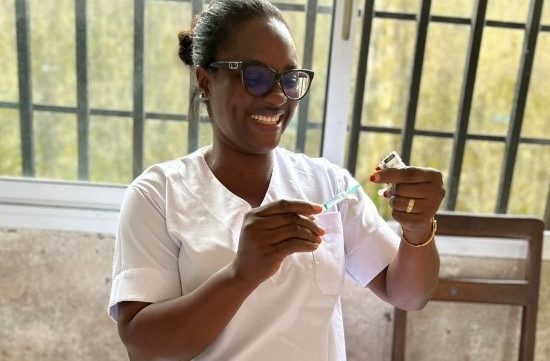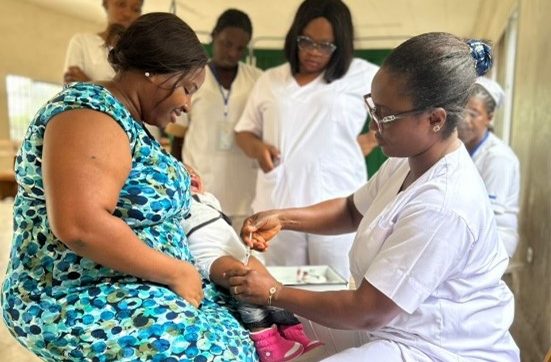Malaria Vaccine Introduction in Cameroon
The Boost Community highlights the stories of members committed to immunization work at the national and sub-national levels. The Boost Member Spotlight Series will regularly feature active Boost members who are engaged in relevant and innovative immunization activities in their contexts. If you have a story to share, please contact us at info@boostcommunity.org.
Introducing Dr. Besong
Dr. Oben Pamela epse Besong is a pharmacist trained at the Faculty of Medicine and Pharmaceutical Sciences of the University of Douala, Cameroon. Since March 2021, she has been serving as the Coordinator for the Expanded Program on Immunization (EPI) for the southwest region of Cameroon. In this role, she is responsible for coordinating capacity building, vaccination, disease surveillance, cold chain management, and monitoring and evaluation of EPI activities in the region. Dr. Oben has collaborated with international organizations such as UNICEF and the Clinton Health Access Initiative (CHAI) to reach thousands of zero-dose children in insecure and hard-to-reach communities with life-saving vaccines, and to improve the uptake of under-utilized vaccines (e.g. HPV, Covid-19) in the face of high rates of vaccine hesitancy. Dr. Oben is also involved in introducing new vaccines, including COVID-19, HPV in boys, Rotavac, IPV2, and the anti-malarial RTS,S vaccine. In addition, she is a Frontline Field Epidemiologist and has been actively involved in responding to outbreaks including yellow fever, cholera, measles, polio, COVID-19.
Malaria Vaccination Program in Cameroon
Cameroon is among the 11 countries with the highest malaria burden in the world. Malaria is also the number one cause of mortality in children under five years of age and responsible for 30% of health facility visits. Following the reception of 331,200 doses of the malaria vaccine in November 2023, the Ministry of Public Health announced the introduction of the RTS, S vaccine in 42% of the country’s health districts with moderate to high malaria transmission and related mortality levels.
Three health districts in the Southwest region (Limbe, Tiko, and Mamfe) were included in the RTS,S vaccine introduction. As the Immunization Coordinator, Dr. Oben was responsible for planning, coordinating, and rolling out the vaccines to prioritized health districts.
The RTS,S vaccine was introduced in Cameroon on January 22, 2024, and was introduced into routine vaccination in all vaccinating facilities located in Limbe, Tiko and Buea health districts. The roll-out is still ongoing at the level of vaccinating facilities, where children who arrive 6 months of age are entered in the cohort. The RTS,S vaccine is administered in four doses:
- The first dose is administered to all children aged six months as of January 24, 2024, alongside Vitamin A;
- The second dose is administered seven months after the first dose;
- The third dose is administered at nine months, two months after the second dose, and simultaneously with the yellow fever, measles-rubella, and second dose injectable polio vaccine; and
- The fourth dose is only administered in the 2nd year of life at age 24 months.
She collected data using routine vaccination tools such as vaccination registers, tally sheets, and the online District Health Information System (DHIS2) platform. In addition, Cameroon uses an innovative digital tool to input daily vaccination data, allowing for weekly monitoring of facility performance.
In terms of preliminary results, the vaccination rates for children in the Southwest region are as follows:
1st Dose: 6,902
2nd Dose: 3,017
3rd Dose: 993
High drop-out rates exist between AMV 1-AMV2 (56%) and AMV 2-AMV3 (67%) due to challenges shared below. The fourth dose will be administered from next year (e.g., at 1 year 3 months after 3rd administered dose).

Challenges
Despite a successful rollout and the importance of the vaccine for these health districts, Dr. Oben noted several challenges:
- Lack of Communication and Awareness: The RTS,S vaccine was introduced rapidly, without adequate communication and community sensitization. Meanwhile, widespread social media propaganda branded the vaccine as experimental, claiming that Cameroonians were being used as test subjects, which discouraged many from getting vaccinated.
- Vaccine Availability: The RTS,S vaccine is currently available in only three out of 19 health districts. Although these districts were prioritized due to high malaria morbidity and mortality rates, this has created challenges for parents in non-prioritized districts, some of whom travel long distances to vaccinate their children.
- Logistical Challenges: The introduction of new vaccination appointments at seven and 24 months has been difficult for parental adherence. Additionally, immunization coordinators lack the resources to send reminders via phone calls or text messages, leading to a high dropout rate between the first, second, and third doses of the RTS,S vaccine.
- Data Management Issues: Some EPI focal persons lack the necessary skills to enter vaccination data into the Cameroon Collect platform accurately. Others are overwhelmed with work, leading to delays and discrepancies between the data recorded in the DHIS2 and Cameroon Collect platforms.
Success Stories
While the malaria vaccine rollout has faced several challenges, many success stories underscore the achievements and hope it brings to communities in Cameroon.
- Community Assessment: Prior to the vaccine rollout, the Southwest EPI program conducted an assessment to gauge the perceptions and acceptance of the RTS,S vaccine among parents attending infant welfare clinics. The study revealed that while a significant portion of caregivers (83.6%) were aware of the malaria vaccine, only 54.5% were willing to vaccinate their children. These findings were used as a baseline to plan and organize targeted sensitization activities for the malaria vaccination campaign.
- Effective Planning and Coordination: Several months before the vaccine arrived, the EPI staff held planning sessions at both district and regional levels. A preparedness dashboard was utilized, and weekly online planning meetings took place at the regional and central levels to ensure effective coordination.
- Quarterly Supervision: After the initial rollout of the malaria vaccine, EPI staff conducted quarterly supervision visits to identify challenges, best practices, and potential threats. Some issues, such as limited data management skills, were addressed on-site through mini briefings, while others, like the unavailability of data collection tools, were escalated to the regional level for resolution.
- Advocacy Meetings: The EPI team hosted advocacy meetings with regional and local stakeholders—including governors, mayors, divisional officers, law enforcement, local chiefs, and influencers—were held before the vaccine rollout. These meetings informed and engaged stakeholders, who then used their platforms to disseminate information about the vaccine rollout within their communities.
- Media Campaigns: In the lead-up to and during the vaccine rollout, the EPI team conducted media briefings and interviews to inform the public and counteract rumors and conspiracy theories. However, ongoing community sensitization efforts are needed to further improve malaria vaccine acceptance and demand.
Collaboration and Support from Healthcare Professionals and Other Organizations
Dr. Oben notes that the vaccine acquisition would not have been possible without the support of GAVI, the Vaccine Alliance, which remains a strong developmental partner in the fight against vaccine-preventable diseases in Cameroon. In addition, Cameroon received financial support from partners like Gavi to organize training and advocacy meetings in the region.
Moreover, PMI, the President’s Malaria Initiative, was instrumental in providing community sensitization tools (flyers, banners) that were posted in strategic areas in the community, such as health facilities, markets, and chiefdoms.
Lastly, local organizations like the Cameroon Baptist Convention Health Services (CBCHS) and the Women Empowerment Foundation integrated sensitization on the malaria vaccine into their community health worker training package, thus increasing community awareness.
Looking Ahead
Dr. Oben’s region is committed to continuing its efforts to educate the community about the benefits of malaria vaccination, with a strong emphasis on community education. There is also a pressing need to leverage digital platforms, such as WhatsApp and Facebook, to counteract the false messages spread by anti-vaccine groups. Continuous sensitization through these channels is crucial.
Cameroon plans to involve model parents and women’s groups as peer educators to further engage their communities, sharing experiences and addressing concerns of hesitant parents. Additionally, there is a need for refresher training on the use of the digital tool “Cameroon Collect” for effective data management. Ongoing supervision will play a key role in strengthening capacities, motivating stakeholders, and addressing challenges in vaccine delivery.
Dr. Oben, as a mother, deeply understands the pain of watching a child suffer from a preventable disease. This drives her dedication to ensuring that no child endures such suffering when safe and effective vaccines are available. Her work in her home region feels like giving back to her community, and the population places greater trust in the vaccination program knowing that a “daughter of the soil” is at the helm. Dr. Oben aspires to leverage clinical trials and vaccine research and development activities in Cameroon. We wish her continued success!

Dr. Oben Pamela epse Besong
As a pharmacovigilance focal person, Dr. Oben has strengthened the surveillance system for Adverse Events Following Immunization (AEFI), particularly for routine vaccines. In addition to her national commitment, she is a member of the National Order of Pharmacists of Cameroon and participates in international groups such as the Boost Community. She is also an alumna of the Advanced Course of Vaccinology (ADVAC). Before assuming her current position, she served as a supply chain focal person at the district level and as Deputy Coordinator/Pharmacist in an HIV/AIDS care and treatment center, where she managed the follow-up of 4,000 patients on antiretroviral therapy.


